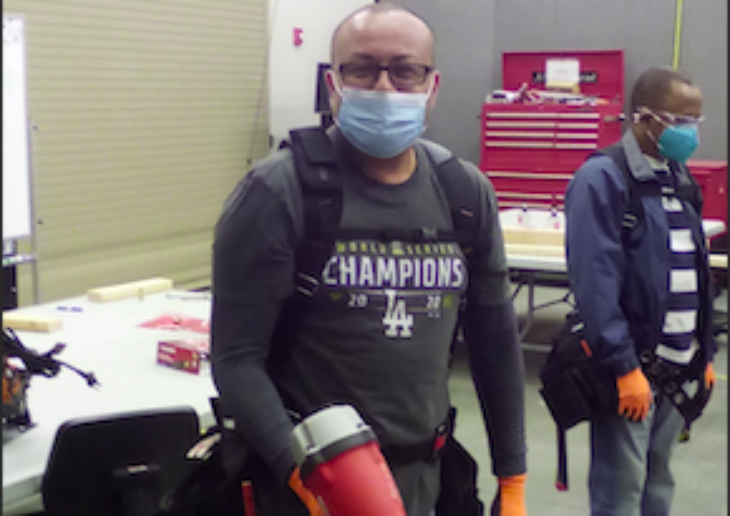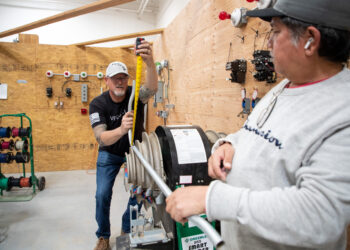
Culinary careers are sizzling again as the hospitality and restaurant industry bounces back from the pandemic and seeks to fill the positions vacated during the COVID-19 downturn. Chaffey College is doing its part to get more cooks in the kitchen.

The commute to his dead-end job had never seemed longer when out of the blue, Joel Hernandez heard a radio ad for free workforce training. With the promise to teach trade fundamentals and make him job-ready in just a few weeks, he signed up for the Trade Technician Career Training Certificate at Barstow Community College and never looked back.
“I originally took this class to help me with my future home,” recalls Hernandez, who wanted to acquire hand tool skills and grow his confidence. But when he put his new abilities to work erecting an 8×8 room, then adeptly installed the wiring and plumbing, the experience also opened new doors of opportunity. After graduating from the non-credit program, he enrolled in for-credit construction courses at the College and found the courage to strike out for a better career.
“I’ve been stuck at my job and haven’t been able to promote,” shares Hernandez. “Now, I have a few certifications under my belt, and I’m getting more interviews.
“I’m more determined than ever before and expect a new job soon.”
The Trade Technician program is one of three non-credit career-training certificates BCC launched in Fall 2021, along with Customer Service and Cal OSHA Forklift Training programs.
“All of them are focused on getting skills to populations who need them,” explains Danielle Jeffers, BCC Project and Career Technician. Not just non-credit, Jeffers says, “We’re portraying them as free workplace training.”
Currently, BCC offers more than 30 workforce certificates as well as free non-credit programs, providing quick hands-on training to fill in-demand jobs immediately. The impetus for the newest non-credit programs came when industry partners put out the call for training fundamentals, essential skills and digital literacy for new and incumbent workers. In addition to receiving support from Strong Workforce and Perkins grants, the Trade Technician program also secured an award from the National Association for Community College Entrepreneurship (NACCE).
In 2020, BCC was one of five colleges to win NACCE’s prestigious national pitch competition, securing $28,000 to help launch the “Trade Technician Jump Start Project.”
“At the time of the NACCE award, Barstow had more than 70 percent of the community on some sort of state program like welfare,” explains Jeffers. In fact, the local poverty rate is 36.4 percent, more than double the state’s, making the new program a much-needed, accessible gateway for low-income and disadvantaged populations. The courses can be completed in just nine weeks at no cost and are designed to engage high-risk youth, unemployed adults, veterans, those at risk for or experiencing homelessness, and incumbent workers seeking retraining opportunities.
“Barstow Community College is at the forefront of helping our community to have trained employees that will benefit businesses,” says Dr. Crystal Nasio, Dean of Instruction, Workforce, and Economic Development at BCC. “It is our goal to create a pipeline of highly qualified graduates who will meet and exceed workplace expectations.”
In-demand essential skills and digital literacy courses are a part of all three non-credit programs. According to Jeffers, those crucial components have been a huge success with students, employers … and her own family.
“I even set up my dad, who’s been in the warehouse industry for 30 years,” shares Jeffers. When her father’s work switched from clipboards to Excel spreadsheets, he signed up for the digital literacy course. As Jeffers shares, “He’s like, ‘This is great! I’m going to make all my workers take it.’”
All classes are repeatable, so students can brush up until they master their new abilities. Says Jeffers, “It’s been really good for people like my dad, who have been in the industry a long time, but the skills and technology are changing.”
While the Warehouse Forklift and Customer Service certificates end with online capstone courses, the culminating Trade Technician class meets in person for hands-on experience. Students learn the basic principles and core skills across eight high-demand trades that touch nearly every industry and business in the community, including plumbing, HVAC, electrical, welding and construction. It’s everything they need to apply immediately for entry-level, living-wage jobs.
“A lot of students who are taking the course don’t know what type of program they want to enter,” says Jeffers. So, “You get a taste of a bunch of different things at this Trade Technician ‘buffet,’ and then, when you find the one that fits, you can enter a [for-credit] program.”
So far, the Trade Technician certificate has a 100-percent hire rate, partly because students do interview, resume, and cover letter workshops during the program. Plus, participants who complete the training receive guaranteed interviews with partnering employers. According to Jeffers, “Those interviews have led to tons of jobs.”
Industry partners include PG&E, which hires program grads into the unique “Hinkley Program” for paid work experience. Participants receive additional career development and on-the-job training in outdoor facilities maintenance. During the program, participants can gain certifications in forklift operation, first aid, and Hazardous Waste Operations and Emergency Response (HAZWOPER). Upon completion, participants receive a gift of a toolset and help with job placement.
“There’s always demand for someone in the trades,” says industry partner Jessica Bails, Senior Technical Project Manager at PG&E. “We take the graduates from the College, put them into our program, give them workforce training with an actual employer, and then we get them hired out to different companies within the community.”
So far, PG&E itself has hired six grads from the Trade Technician program and is looking forward to more. The project manager says that receiving well-trained Trade Technician grads is a huge plus.
“We’re already seeing the fruits of our labor, and bringing in people who have experience is going to fill immediate job openings,” says the industry partner. “I’m really excited to continue … to pull from that program and hire.” She adds that the company has a “fantastic” ongoing relationship with the College that supports PG&E’s workforce development:
“Without Barstow Community College, we wouldn’t be able to fill some of our positions,” says Bails. “We definitely want to continue for years and years to come.”
According to Jeffers, the teamwork with industry partners has been unbeatable, benefiting employers, students and the community. She says, “We’re thankful for these partnerships because they have been the backbone of keeping these programs running.”
After a successful first year, the College plans to expand non-credit offerings. Currently, BCC is designing entrepreneurship courses for its makerspace, in addition to Certified Nursing Assistant (CNA) training for students with medical interests.
“The workforce training is going to continue to grow,” effuses Jeffers.
Increased offerings will be warmly received, as program graduates like Hernandez are letting their friends and family know about the possibilities.
“I learned a lot in the course, and I never realized before the many opportunities that are available in the trades,” says the budding technician.
“I’d definitely recommend this program.”
To learn more and register for BCC’s non-credit Workforce Ready certificates, including the Trade Technician, Customer Service and Forklift Operations programs, visit https://www.barstow.edu/departments/career-technical-education-cte/non-credit-programs-free-community

Culinary careers are sizzling again as the hospitality and restaurant industry bounces back from the pandemic and seeks to fill the positions vacated during the COVID-19 downturn. Chaffey College is doing its part to get more cooks in the kitchen.

Dual Enrollment (DE) is catching on as students and their families recognize the advantages of earning college credit while still working towards high school graduation. But students aren’t the only… Read More – Good News for Community Colleges: Dual Enrollments Are on the Rise

Enrollment in courses not offering credit toward a degree or certificate are outpacing for-credit programs in some states (Fed Communities). And it’s no wonder. With the convenience, minimal time commitment,… Read More – No Credit, No Problem: Noncredit Courses Gain Steam